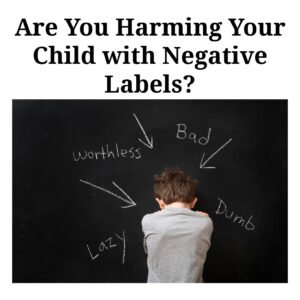 Why We Should Avoid Labeling Our Kids
Why We Should Avoid Labeling Our Kids
As a mother and someone who works in mental health with extensive experience in child development, I understand the challenges of raising children and the importance of helping them grow into healthy, confident individuals. One of the most crucial aspects of parenting that often gets overlooked is the language we use when speaking to our kids. In this blog post, I want to shed some light on the dangers of assigning negative labels to our children and offer some practical tips on how we can change our approach to nurture their self-esteem and development.
Recently, my youngest child started to struggle with listening and following instructions. Initially, I found myself becoming frustrated and resorted to using negative labels like “Why don’t you ever listen?” or “You’re being difficult.” This approach only seemed to worsen the situation.
What I Did Wrong
Using negative labels and expressing my frustration didn’t help my child understand why their behavior was problematic. Instead, it made them feel defensive and hurt, which led to more resistance and tension between us. I realized that I needed to change my approach and try a different tactic to address the issue.
My Approach to Change
Shifted to Positive Language: I made a conscious effort to stop using negative labels and focused on describing the behavior instead. For instance, instead of saying, “You never listen,” I said, “It’s important that you listen to me so we can understand each other better.”
Gave Clear Instructions: I found that being specific with my instructions helped my child understand what was expected of them. Instead of vague statements, I provided clear and concise directions.
Provided Choices: Giving my child some control over their decisions helped improve their listening skills. By offering choices, such as “Do you want to clean your room now or after dinner?” they felt more empowered and were more willing to listen.
Praised Positive Behavior: I made sure to acknowledge and praise my child when they did listen or followed instructions. This positive reinforcement encouraged them to continue the good behavior.
Stayed Calm and Patient: I learned to manage my own emotions and remain calm, even when my child wasn’t listening. By modeling patience and composure, I created a more positive environment for communication.
Encouraged Open Dialogue: I made an effort to listen to my child’s perspective and feelings, which helped build trust and strengthen our relationship. We started having more meaningful conversations about their day and challenges.
The Dangers of Negative Labels
When we assign negative labels to our children, such as “you are a bad kid,” “you never listen,” or “why are you so dumb,” we are unknowingly creating a narrative that can be incredibly damaging to their self-perception. Here’s why:
Impact on self-esteem: Negative labels can lead children to believe that these labels define who they are. Over time, this can erode their self-esteem and make them doubt their worth and abilities.
Influence on behavior: If children hear negative labels repeatedly, they may start to believe that they are naturally inclined to behave in certain ways. This can lead to a self-fulfilling prophecy, where they begin to act according to the labels they’ve been assigned.
Strained relationships: Labeling our children negatively can damage our relationship with them. They may become resistant to our guidance or withdraw emotionally, feeling misunderstood or judged.
Shifting Our Approach
Instead of using negative labels, we can adopt a more positive and constructive approach to parenting. Here are some strategies to help us make this shift:
Focus on behavior, not identity: When addressing a child’s actions, separate the behavior from the child. For example, instead of saying, “You never listen,” try, “When you don’t listen, it makes it hard for me to help you.”
Use positive reinforcement: Praise your child when they exhibit good behavior. This encourages them to continue making positive choices and boosts their self-esteem.
Set clear expectations and boundaries: Clearly communicate your expectations and the reasons behind them. This helps children understand the consequences of their actions without feeling attacked.
Practice empathy and patience: Remember that children are still learning and developing. Approach situations with empathy and patience, and give them room to grow and learn from their mistakes.
Encourage open communication: Create a safe space for your child to express their thoughts and feelings without fear of judgment. This helps build trust and strengthens your relationship.
Final Thoughts
As parents, our words hold immense power over our children’s lives. By being mindful of the language we use and focusing on positive, constructive communication, we can support our children’s healthy development and build strong, loving relationships with them. Let’s work together to raise a generation of confident, resilient, and emotionally intelligent kids!
Let’s continue this conversation! Share your experiences, thoughts, and questions in the comments below—together, we can support each other and create positive change for our kids!



